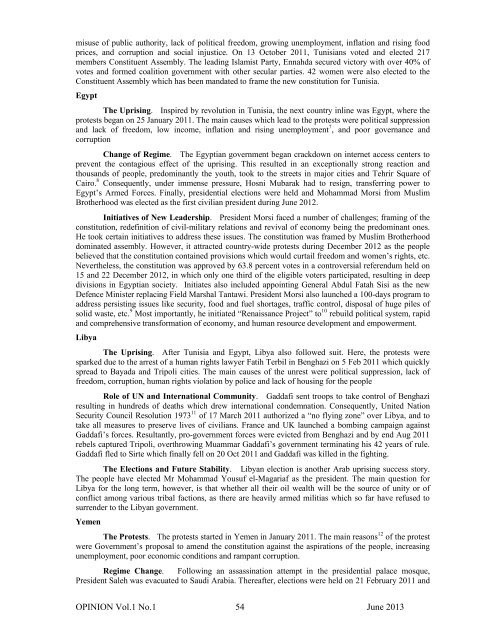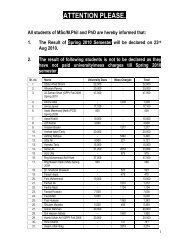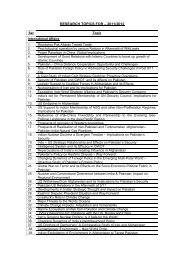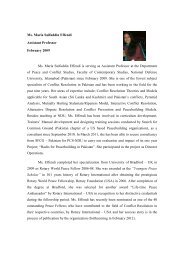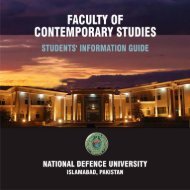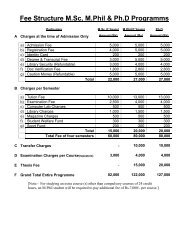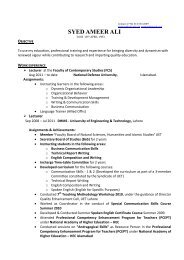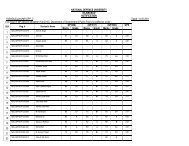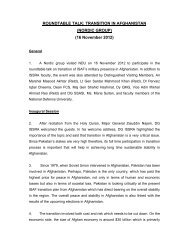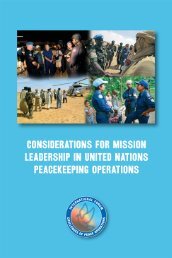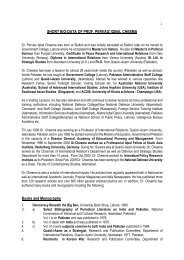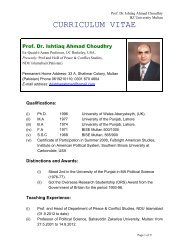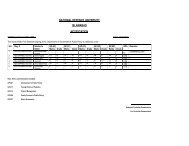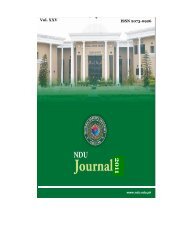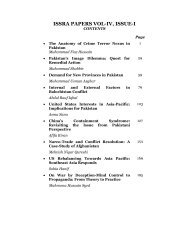OPINION Vol.1, No.1 June 2013 - National Defence University
OPINION Vol.1, No.1 June 2013 - National Defence University
OPINION Vol.1, No.1 June 2013 - National Defence University
You also want an ePaper? Increase the reach of your titles
YUMPU automatically turns print PDFs into web optimized ePapers that Google loves.
misuse of public authority, lack of political freedom, growing unemployment, inflation and rising food<br />
prices, and corruption and social injustice. On 13 October 2011, Tunisians voted and elected 217<br />
members Constituent Assembly. The leading Islamist Party, Ennahda secured victory with over 40% of<br />
votes and formed coalition government with other secular parties. 42 women were also elected to the<br />
Constituent Assembly which has been mandated to frame the new constitution for Tunisia.<br />
Egypt<br />
The Uprising. Inspired by revolution in Tunisia, the next country inline was Egypt, where the<br />
protests began on 25 January 2011. The main causes which lead to the protests were political suppression<br />
and lack of freedom, low income, inflation and rising unemployment 7 , and poor governance and<br />
corruption<br />
Change of Regime. The Egyptian government began crackdown on internet access centers to<br />
prevent the contagious effect of the uprising. This resulted in an exceptionally strong reaction and<br />
thousands of people, predominantly the youth, took to the streets in major cities and Tehrir Square of<br />
Cairo. 8 Consequently, under immense pressure, Hosni Mubarak had to resign, transferring power to<br />
Egypt’s Armed Forces. Finally, presidential elections were held and Mohammad Morsi from Muslim<br />
Brotherhood was elected as the first civilian president during <strong>June</strong> 2012.<br />
Initiatives of New Leadership. President Morsi faced a number of challenges; framing of the<br />
constitution, redefinition of civil-military relations and revival of economy being the predominant ones.<br />
He took certain initiatives to address these issues. The constitution was framed by Muslim Brotherhood<br />
dominated assembly. However, it attracted country-wide protests during December 2012 as the people<br />
believed that the constitution contained provisions which would curtail freedom and women’s rights, etc.<br />
Nevertheless, the constitution was approved by 63.8 percent votes in a controversial referendum held on<br />
15 and 22 December 2012, in which only one third of the eligible voters participated, resulting in deep<br />
divisions in Egyptian society. Initiates also included appointing General Abdul Fatah Sisi as the new<br />
<strong>Defence</strong> Minister replacing Field Marshal Tantawi. President Morsi also launched a 100-days program to<br />
address persisting issues like security, food and fuel shortages, traffic control, disposal of huge piles of<br />
solid waste, etc. 9 Most importantly, he initiated “Renaissance Project” to 10 rebuild political system, rapid<br />
and comprehensive transformation of economy, and human resource development and empowerment.<br />
Libya<br />
The Uprising. After Tunisia and Egypt, Libya also followed suit. Here, the protests were<br />
sparked due to the arrest of a human rights lawyer Fatih Terbil in Benghazi on 5 Feb 2011 which quickly<br />
spread to Bayada and Tripoli cities. The main causes of the unrest were political suppression, lack of<br />
freedom, corruption, human rights violation by police and lack of housing for the people<br />
Role of UN and International Community. Gaddafi sent troops to take control of Benghazi<br />
resulting in hundreds of deaths which drew international condemnation. Consequently, United Nation<br />
Security Council Resolution 1973 11 of 17 March 2011 authorized a “no flying zone” over Libya, and to<br />
take all measures to preserve lives of civilians. France and UK launched a bombing campaign against<br />
Gaddafi’s forces. Resultantly, pro-government forces were evicted from Benghazi and by end Aug 2011<br />
rebels captured Tripoli, overthrowing Muammar Gaddafi’s government terminating his 42 years of rule.<br />
Gaddafi fled to Sirte which finally fell on 20 Oct 2011 and Gaddafi was killed in the fighting.<br />
The Elections and Future Stability. Libyan election is another Arab uprising success story.<br />
The people have elected Mr Mohammad Yousuf el-Magariaf as the president. The main question for<br />
Libya for the long term, however, is that whether all their oil wealth will be the source of unity or of<br />
conflict among various tribal factions, as there are heavily armed militias which so far have refused to<br />
surrender to the Libyan government.<br />
Yemen<br />
The Protests. The protests started in Yemen in January 2011. The main reasons 12 of the protest<br />
were Government’s proposal to amend the constitution against the aspirations of the people, increasing<br />
unemployment, poor economic conditions and rampant corruption.<br />
Regime Change. Following an assassination attempt in the presidential palace mosque,<br />
President Saleh was evacuated to Saudi Arabia. Thereafter, elections were held on 21 February 2011 and<br />
<strong>OPINION</strong> <strong>Vol.1</strong> <strong>No.1</strong> 54 <strong>June</strong> <strong>2013</strong>


